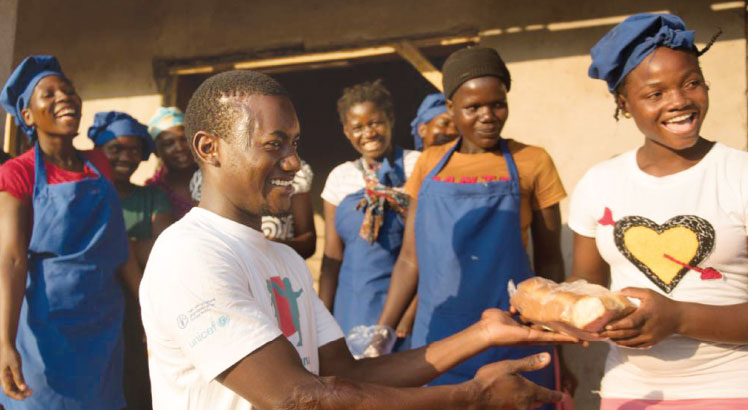Afikepo helping teens to reach full potential
For members of Lughano Adolescent Girls Group in group village head Mwenelupembe in Karonga, the saying that half a loaf is better than none is true both literary and figuratively.
The girls, 23 of them, own and run a bakery in their home village. The building housing the bakery is a brick-and-mortar affair, with a wisp of smoke escaping intermittently from under the eaves and rising slowly to the sky on this hot afternoon.
Over a dozen girls are gathered outside this ordinary house, chattering and performing various chores. Some knead the flour while others enter the bakery and soon emerge with teary eyes.
As the girls walk in, you cannot help observing a ‘ritual’ they perform. As they walk in, they take off their shoes, and everyone does that without exception.
“People visit the toilet or step on some other dirt. This is a healthy area where we keep a lot of foodstuffs such as flour and cooking oil, and we do not want them to be contaminated,” explains Lawrence Malongo, a group member.
The bakery is the group’s second enterprise, having started with a garden where they grow various vegetables to supplement their diets and finances.

The bakery was established as an intervention under the Afikepo Nutrition Programme, a five-year undertaking to support multi-sectorial efforts to curb malnutrition among children below five years, women of childbearing age, pregnant and breastfeeding women and adolescent girls.
The programme is funded by the European Union and implemented with support from Malawi Government, FAO and Unicef in Chitipa, Karonga, Mzimba, Nkhata Bay, Nkhotakota, Salima, Kasungu, Chiradzulu, Thyolo and Mulanje.
Mbilika Simwaba, Afikepo district nutrition officer for Karonga, explains that the programme focuses on promoting nutrition-sensitive agriculture by promoting nutrient-dense crops such as orange-fleshed sweet potatoes, orange-fleshed maize, soya beans and fortified beans.
“We work with farmers through care groups. Households are mobilised into groups where we target under-five children, pregnant women, and adolescent girls,” says Simwaba.
Afikepo works with 411 care groups and 241 adolescent girls’ groups in Karonga, focusing on crop demonstration plots.
“The groups are also engaged in income-generating activities. Lughano Adolescent Girls Group, for instance, runs the bakery. The bakery produces buns and bread to which we add orange-fleshed sweet potato flour as an ingredient since it has vitamin A,” she adds.
Lughano Adolescent Girls Group comprises of out-of-school girls, some of whom dropped out of school while others completed their studies. Most of them are now in married. Dropping out of school or even getting pregnant early would be regarded as a misfortune by some, but the girls did not want that to stand in their way of earning a living.
The group started in 2020 with 30 members, but it now has 23 after seven others married in areas far from the village.
Malongo, 18, dropped out of school in 2016 when she was 11. She now has two children, the youngest is only nine months old.
“We are young people, and we got married when we were still young. Because of that, we were advised to form a club and grow vegetables to diversify our diets in line with the six food groups,” she says.
She says they also have a village bank to which members contribute K100 each in shares. Earnings from the bakery are also added to the shares.
Mirriam Sichali, pregnant with her third child, is a regular bakery customer. She could easily buy her bread elsewhere, but the quality of the bakery’s products has had her hooked. Besides, she feels duty-bound to promote the girls so they and the area can prosper.
“Ever since the bakery opened, I buy their bread every day, and I have never regretted it. Their bread is delicious, and it is satisfying and adds energy. We mostly pay in advance because if you do not, it finishes quickly,” she says.
Afikepo tries to encourage the out-of-school adolescents to return to school, and only when they fail do they come in with income-generating activities to enable them to stand on their feet and buy food for their households, according to Simwaba.
There is a serious need to help girls that drop out of school because if this does not happen, their future will remain doomed and the poverty cycle continue. Girls play a vital role in communities, including upbringing of every child.
The problem of girls dropping out of school in the country is serious and this has been an issue haunting the education system in Malawi for a long time, according to published reports
The most commonly reported reason for girls and boys dropping out of school in the 2018 Malawi Government’s Education Management and Information Systems survey collected by heads of schools was family responsibilities followed by lack of interest.





